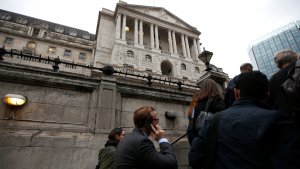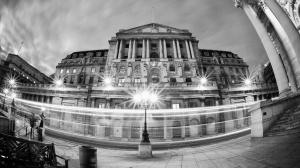Michael Saunders, a member of the Monetary Policy Committee, also addressed the impact on business of uncertainty caused by the EU exit.
Interest Rates Could Fall Regardless Of Brexit Outcome, Says Bank Economist
Michael Saunders, a member of the Monetary Policy Committee, also addressed the impact on business of uncertainty caused by the EU exit.

A member of the Bank of England’s Monetary Policy Committee has suggested the base rate could be cut even if a no-deal Brexit is avoided.
Michael Saunders said he expects to see continuing uncertainty in the UK regardless of what happens next with its relationship with Europe.
Speaking to business leaders in Barnsley, South Yorkshire, he said: “If the UK avoids a no-deal Brexit, monetary policy also could go either way and I think it is quite plausible that the next move in the bank rate would be down rather than up.”
The pound dropped 0.5% against the dollar immediately after his speech on Friday morning, with a pound worth 1.2272 dollars.
Michael Saunders looks at the impact of persistently high Brexit uncertainty on businesses and consumers. And he talks about what it means for the UK’s economic outlook and monetary policy https://t.co/34bO8njRZf pic.twitter.com/jVBgMoUdAd
— Bank of England (@bankofengland) September 27, 2019
Mr Saunders, an economist who has been on the rate-setting committee since 2016, added that rates could rise if Brexit uncertainty falls significantly and global growth recovers.
But he added: “Another scenario, and this is perhaps more likely to me, is of prolonged high Brexit uncertainty (even without a no-deal Brexit actually occurring).
“In this case, it might well be appropriate to maintain a highly accommodative monetary policy stance for an extended period, and perhaps to loosen policy at some stage, especially if global growth remains disappointing.”
Mr Saunders also said Brexit is also causing businesses to spend too much time on contingency planning.

He said: “Brexit uncertainties have created an opportunity cost: for example, a considerable amount of management time has been taken up in dealing with Brexit contingency plans.
“This probably reduces the amount of time and resources that can be devoted to other more fruitful issues. This is an issue that often comes up in discussions with businesses.
“The economy has not crashed. But the effect of Brexit uncertainties is perhaps akin to the economy developing a slow puncture such that growth has slowed to a mere crawl.”
Slow growth in the eurozone has seen the European Central Bank cut rates and inject more money through quantitative easing into the markets.
The US Federal Reserve earlier this month also cut interest rates – following months of heavy lobbying from US President Donald Trump.
He wanted to see rates cut in an attempt to stimulate economic growth, after the US-China trade war hit global markets.
By comparison, the Bank of England has held rates at 0.75%, awaiting the potential outcome from Brexit.
Simon Neville is PA City Editor.
Thanks for signing up to Minutehack alerts.
Brilliant editorials heading your way soon.
Okay, Thanks!

